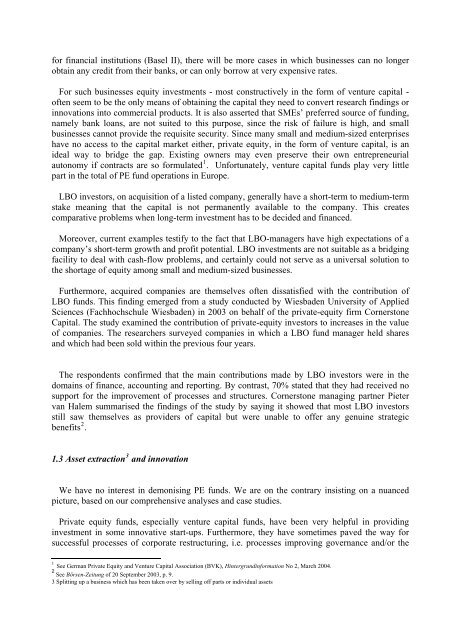Executive summary - Udo Bullmann
Executive summary - Udo Bullmann
Executive summary - Udo Bullmann
- No tags were found...
Create successful ePaper yourself
Turn your PDF publications into a flip-book with our unique Google optimized e-Paper software.
for financial institutions (Basel II), there will be more cases in which businesses can no longerobtain any credit from their banks, or can only borrow at very expensive rates.For such businesses equity investments - most constructively in the form of venture capital -often seem to be the only means of obtaining the capital they need to convert research findings orinnovations into commercial products. It is also asserted that SMEs’ preferred source of funding,namely bank loans, are not suited to this purpose, since the risk of failure is high, and smallbusinesses cannot provide the requisite security. Since many small and medium-sized enterpriseshave no access to the capital market either, private equity, in the form of venture capital, is anideal way to bridge the gap. Existing owners may even preserve their own entrepreneurialautonomy if contracts are so formulated 1 . Unfortunately, venture capital funds play very littlepart in the total of PE fund operations in Europe.LBO investors, on acquisition of a listed company, generally have a short-term to medium-termstake meaning that the capital is not permanently available to the company. This createscomparative problems when long-term investment has to be decided and financed.Moreover, current examples testify to the fact that LBO-managers have high expectations of acompany’s short-term growth and profit potential. LBO investments are not suitable as a bridgingfacility to deal with cash-flow problems, and certainly could not serve as a universal solution tothe shortage of equity among small and medium-sized businesses.Furthermore, acquired companies are themselves often dissatisfied with the contribution ofLBO funds. This finding emerged from a study conducted by Wiesbaden University of AppliedSciences (Fachhochschule Wiesbaden) in 2003 on behalf of the private-equity firm CornerstoneCapital. The study examined the contribution of private-equity investors to increases in the valueof companies. The researchers surveyed companies in which a LBO fund manager held sharesand which had been sold within the previous four years.The respondents confirmed that the main contributions made by LBO investors were in thedomains of finance, accounting and reporting. By contrast, 70% stated that they had received nosupport for the improvement of processes and structures. Cornerstone managing partner Pietervan Halem summarised the findings of the study by saying it showed that most LBO investorsstill saw themselves as providers of capital but were unable to offer any genuine strategicbenefits 2 .1.3 Asset extraction 3 and innovationWe have no interest in demonising PE funds. We are on the contrary insisting on a nuancedpicture, based on our comprehensive analyses and case studies.Private equity funds, especially venture capital funds, have been very helpful in providinginvestment in some innovative start-ups. Furthermore, they have sometimes paved the way forsuccessful processes of corporate restructuring, i.e. processes improving governance and/or the1See German Private Equity and Venture Capital Association (BVK), Hintergrundinformation No 2, March 2004.2 See Börsen-Zeitung of 20 September 2003, p. 9.3 Splitting up a business which has been taken over by selling off parts or individual assets





